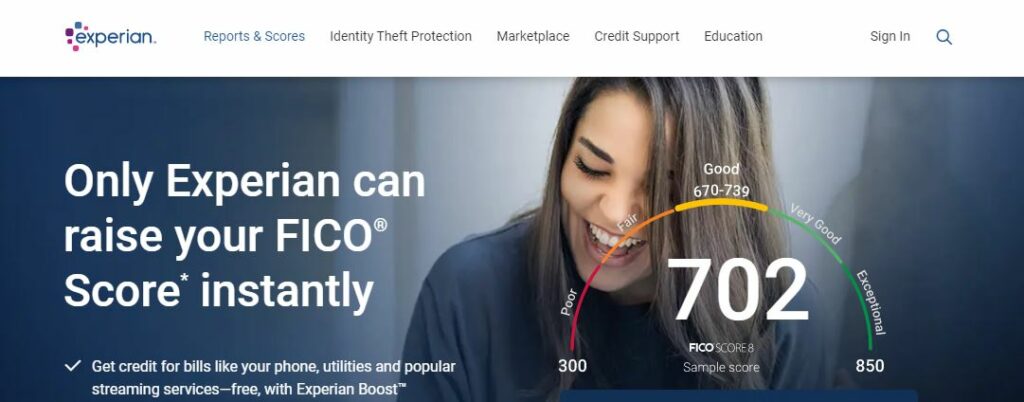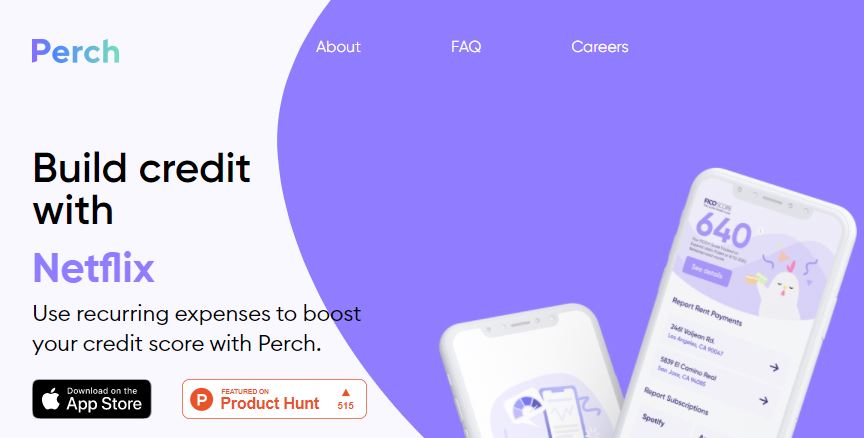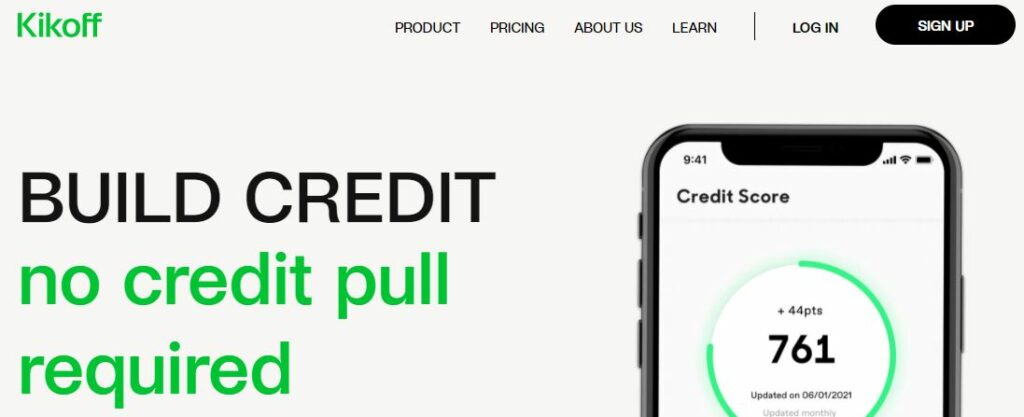Netflix has about 222 million subscribers, and Disney, which owns Hulu and ESPN, has nearly another 200 million subscribers. That’s a lot of opportunity for millions to increase their credit scores.
If you’ve wondered whether Netflix payments can help you build credit, the short answer is yes.
Almost all streaming-service subscriptions can help build and bump up your credit scores. However, you’ll have to sign up for a service first. Here are your options:
Table of Contents
How To Build Credit With Subscriptions: 6 Easy Steps
The simplest way to boost credit with Netflix is to sign up for Experian Boost. It’s easy to set up a way that you can boost your credit score by making your monthly subscription payments. This method will also work with other streaming services, including Disney+ and HBO. It should take about 10 minutes to complete these steps, and then you can sit back and wait. Your credit score will start to rise almost immediately, but it will take a few months to establish a pattern of on-time payments before it truly starts to increase.
Anyone can sign up for Experian Boost, but consumers with little to no credit and those with very poor to fair credit scores benefit most. Of people with poor credit scores, 87% saw an increase. Among those with fair credit scores, 63% increased their scores.
Here are the steps required to link your Netflix payments to Experian Boost.
- Sign up for Experian Boost: This is a free service through Experian, one of the major credit bureaus. You’ll need to provide your full name, address, Social Security number and email. No credit card is required.
- Link your bank account: You’ll need to link the account you use to pay your bills. That can be a bank account or credit card. Look for your bank, select it and use your credentials to sign in. You can add as many accounts as you like.
- Select and add your Netflix and/or Hulu accounts: At this point, you’ll have the option to add any monthly payments to your Experian credit file. This includes Netflix, Hulu, utility bills, phone bills and other monthly services with recurring charges.
- Use automatic payments strategically: This is the simplest way to pay recurring charges, and on-time payments of those credit card bills are reported to the major credit bureaus. If you decide to use a debit card instead, you probably won’t build credit with these payments unless you sign up for a credit reporting service.
- Make sure your credit card is set to autopay: This will lessen the likelihood of a late payment, particularly if you’re facing a family emergency or lose track of deadlines. Plus, by paying off your charges each month, you won’t have to pay interest.
- Check your credit score: Wait a day or two, then check your credit score. You should see a boost from your past payment history. It may be small, but as long as you keep making your monthly payments on time, your score should keep increasing. Monitor it periodically and you should be able to see real progress within a matter of a few months. Experian says the average credit score bump from setting up an account is 13 points.
READ MORE: How to build credit
Pro tip: It’s a good idea to periodically monitor the subscription rates to ensure your rates are what you’re expecting. Companies love it when subscribers sign up for autopay, because they’re less likely to cancel service over a price change. In fact, many customers may not even realize the price has increased. Make sure there is always enough money (whether in your bank account or credit limit) that the payments will go through on time.
READ MORE: How to get a free credit score
Why Do Subscriptions Build Credit?
According to Experian, more than 4 million people have connected utility and telecom accounts such as Netflix and Hulu to Experian Boost, and they’re seeing an average 13-point increase in their credit score. If you’re a longtime Netflix user, paying your Netflix account balance every month can count as an on-time payment on your credit report.

How Experian Boost Builds Credit
Experian Boost is a free feature that helps you improve your credit score by paying monthly bills on time. Usually, only credit card payments and other loans, like student loans, auto loans and mortgages are used to calculate your credit score. But using Boost allows your streaming, phone, and utility payments to “count” toward your Experian credit score. This service improves your credit score with on-time HBO, Hulu, Disney+, and Starz bill payments.
For example, if you signed up for Netflix in February 2013, over 10 years you would have built a history of 120 on-time payments with Experian Boost (provided you made all of those payments on time.) This would definitely help students or others with limited access to new credit build credits score over time.
Experian Boost has helped many users with “thin files,” less than five accounts in their credit file, increase their FICO score. Other statistics included:
- Overall, 85% of thin-file consumers who used Experian Boost saw their FICO scores increase.
- On average, consumers saw an increase of 19 points.
- 15% of those users moved to a higher credit score range.
- 41% shed their thin-file status.
All you need to do is answer a few security questions and connect to your bank. Any bills you add will need to have three months of payments within the last six months and have to be in your name.
Experian Boost also offers a one-time dark web scan, to make sure your personal information is secure.
Experian has an app for iPhone and Android. You can sign up for the program directly through the mobile app. Once you’ve joined, you’ll be able to view which subscriptions were added to your credit report.
Other Services That Can Help You Build Credit

Perch Credit
Perch Credit is a free credit-building platform like Experian Boost that allows you to build your credit using your recurring expenses like Netflix, Hulu, Spotify, and Apple Music. It was designed to help young adults develop their credit using this nontraditional data. Their mission is to teach financial literacy and help people jump-start their credit scores.
It is a quick and easy set up in as little as five minutes with a submission of a photo ID or other documents as needed. Perch helps increase your credit score through automated credit building, and it can report just six months of rental payments to see a positive impact on your credit score.

Kikoff Credit
Kikoff gives you a $500 balance or revolving line of credit that doesn’t expire. You can use the cash to establish Credit by purchasing something in their store starting at $10. The purchase is made with the Kikoff Credit Account. Your monthly payment helps you build a credit history. They also do not pull your credit, so there’s no harm to your current score and no need to link your bank account.
You cannot access the $500 any other way except through purchasing items through their store.
Kikoff has no administrative fees, annual fees, late fees, finance charges, 0% APR, and end date. The company doesn’t do a credit check, and no deposit is required to get started — a $2 monthly membership with 0% interest and no additional fees. Membership commitments are for 12 months, but you can cancel anytime and pay off your balance.
Kikoff reports to Equifax and Experian and can take up to six weeks to show up on your credit report. You can keep track of your score on your account, and they email you with any updates to your account. This platform is available for iOS and Android and in 47 states.
READ MORE: Does Kikoff really work? We signed up to test it out

Grow Credit Mastercard
Grow Credit is one of the best credit cards to build credit using everyday purchases. It allows you to establish credit as you pay for qualifying monthly subscriptions, including eligible bills, TV, music, and other streaming services. You pay off the bill in full each month and build credit in the process.
To apply for this interest-free card, connect your bank account and add your subscriptions. Then use your new card as your payment method to make your payments consistently.
You can easily apply through the app for iOS and Android in minutes; then, you update your payment method from your Netflix or Hulu account. See their list of qualified subscription-based companies based on the pricing tier you choose.
All charges must be paid in full via ACH payment from your linked bank account. They report to all three credit reporting companies, which is a bonus. Most will report to one or two, but this Grow Credit to all three, which is the gold standard.
The card is tied to one of four membership plans, depending on your eligibility. These plans allow you to build credit with qualifying subscriptions, each with a different limit. Pricing varies. They have four membership tiers:
- “Build” membership (free): This plan offers a $17 monthly spending limit on subscriptions (Netflix, Hulu, Spotify, Pandora, etc.) Applicants must direct deposit at least $1200 per month (for at least two months) to qualify.
- “Secured” membership ($2.99 per month): Applicants must have a bank account that’s older than 30 days with a minimum balance of $1. A $17 security deposit is also required to cover your $17 subscription fees. The security deposit is returned after 12 consecutive months of on-time payments.
- “Grow” membership ($4.99 per month): $50 monthly spending limit and access to “premium” subscriptions and cellphone bills, including Verizon Wireless, AT&T, Sprint, and T-Mobile.
- “Accelerate” membership ($9.99 per month): $150 monthly spending limit toward premium subscription payments. The list includes JustFab, Dollar Shave Club, HBO Now, HBO Max, PlayStation Plus, Xbox Live, ESPN+, CBS, Showtime, iHeartRadio, Amazon Prime, Disney+.
Use a Traditional Credit Card
If you have bad credit or no credit, you can apply for a secured credit card instead. Set up automatic payments for a couple of your subscription services and link your bank account so that credit card repayment will be handled. If you make all of your monthly payments on time, this is an easy way to build credit.
Why Is Your Credit Score Important?
Most lenders use the FICO model to assess your creditworthiness.
Your credit score will determine whether you’re offered a credit card or loan, your credit limit, and the interest rate you’ll pay. If you’ve not yet applied for a credit card or loan, you have “no credit.” Using a service that credits you for your subscriptions prevents you from being “credit invisible.”
FICO and VantageScore are the two most popular scoring models. While most of the criteria are similar, there are some variations in score classifications. Here is a breakdown:
| FICO score range | VantageScore range | |
| Excellent credit | 800 and up | 781 and up |
| Very good credit | 740 to 799 | 661 to 780 |
| Good credit | 670 to 739 | 601 to 660 |
| Fair credit | 580 to 669 | 500 to 600 |
| Poor credit | 300 to 579 | 300 to 499 |
Pro tip: It can be difficult for a teen to build credit because they aren’t eligible for credit cards until they turn 18, but many 18-year-olds need to submit loan applications for student loans or car loans. That’s why using subscription payments that are tied to a debit card can be a good way to establish a “starter” credit score.
READ MORE: Which credit report, score or credit bureau is most accurate?
How To Check Your Credit Reports
Checking your credit history and credit scores can help you better understand your current creditworthiness. Regularly checking your credit reports can help you be more aware of what lenders may see. Checking your credit reports can also help you detect any inaccurate or incomplete information if you notice any inaccuracies, report and correct them immediately.
Pro tip: You’re entitled to one free copy of your credit report every 12 months from each of the three nationwide credit reporting companies, Experian, Transunion, and Equifax. Order online from annualcreditreport.com, the only official website for free credit reports, or call 1-877-322-8228.
Other Ways to Build Credit
Chime Credit Builder Card
Chime is a financial technology company that offers the same basic functions as a traditional bank.
Chime partners with Bancorp Bank and Stride Bank (both Member FDIC), so your money is protected. Chime offers checking accounts, debit cards and other banking features in a convenient app. It also features Chime SpotMe, which allows users to borrow a small amount of money to carry you over until your next paycheck.
But Chime can also be a good way to build credit with the Chime Credit Builder Card. This is a secured credit card with no set spending limit. Secured credit cards usually require a minimum deposit to open an account. The deposit becomes the card’s credit limit that the cardholder uses to purchase. Chime cardholders don’t have to make a minimum deposit to open an account. They can transfer money into their secured account at any time. Each transfer becomes part of the spending limit for the month. The money transferred covers all the purchases at the end of the billing cycle.
Pro tip: To qualify for this, you need to open a Chime Spending Account. This free checking account has no minimum balance and no overdraft fees. You need direct deposit to qualify for a Credit-Builder secured account; $200 from an employer direct deposit (Venmo and peer-to-peer transfers do not qualify) within the last 365 days as a customer. Then you can apply for the Credit Builder Visa credit card. There is no credit check and no minimum deposit. Chime doesn’t charge fees to use Credit Builder.
Chime touts that participating in this Credit-Builder program can, on average, increase your credit score by 30 points, as long as you make your payments on time.
READ MORE: Chime review
Credit-Builder Loans
These are small limit loan amounts typically less than $1,000, where the money is set aside for you in a secured savings account or CD (certificate of deposit) while you pay off the loan. These loans allow you to build credit while you save money. You make monthly payments with interest for a specified loan term, and once it is paid, the CD unlocks, and you receive the funds minus any interest and administration fees.
These loans are available at a bank, credit union, or online lender. The lender reports your monthly activity and payment to the three major credit bureaus that generate your credit rating.
The Consumer Financial Protection Bureau (CFPB) reports that consumers with thin credit files saw their credit scores increase by 60 points more than participants with existing debt.
Self Credit-Builder Loans
Self is an online lender that does credit-builder loan amounts between $520 to $1,663. You can choose from four plans with the payment term and dollar amount that fits your budget. You can build a credit history for as little as $25 a month. Terms range from 12 to 24 months. You can automate payments and track how your credit score changes over time. When you open a Self account, you can qualify for a Self Visa credit card in as little as three months.
Their interest rates range from 14.70% to 15.97%. Other fees include a $125 finance charge and a one-time $9 non-refundable administrative fee. Available in all 50 states.
READ MORE: Best credit-builder loans
The Bottom Line
Yes, subscriptions can help build and bump up your credit scores, and there are a few ways to build credit using the subscription services you are already paying for.
Credit is important when you need to make major purchases, apply for a job or look for an apartment, but a thin credit file is better than a bad credit score. Anyone old enough to carry a debit card is old enough to start building a credit history.

